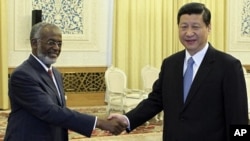Sudan's foreign minister and Chinese leaders have discussed an oil transport fee dispute with South Sudan and the security of Chinese workers.
Sudan Foreign Minister Ali Ahmed Karti wrapped up a two-day visit to Beijing, asking China for help negotiating oil transport fees with newly independent South Sudan.
An agreement that would require oil-rich South Sudan to pay fees to transport its oil through the north broke down after Khartoum began confiscating oil from the South.
In response, South Sudan cut its oil supplies to the north. Karti asked Chinese Vice President Xi Jinping for help in mediating the dispute.
“We are inviting also the companies, CNPBC and Petronas to give ideas also to help the mediation," explained Karti, "and we are also inviting China and Malaysia and for sure, the Indians will be accepted also to give any ideas that will help the mediation to get a solution.”
South Sudan became independent last year, under a 2005 peace deal. The split left most of the oil fields in South Sudan and the north in control of the pipelines for export.
China is the biggest investor in oil facilities in both countries. Before the South slashed production, China received five percent of its oil supplies from Sudan.
Chinese Vice President Xi Jinping said he hopes Sudan and South Sudan will resolve their differences soon. Foreign Ministry spokesman Hong Lei said that Xi also expressed support for Sudan during his meeting with Karti.
In January, 29 Chinese workers were kidnapped by rebel forces near Sudan’s border with the south.
Foreign Ministry spokesperson Hong Lei says this week’s meetings addressed the security situation and China worries about growing tensions between Sudan and South Sudan.
Last January’s kidnapping was the fourth abduction of Chinese nationals in the African country. Five Chinese workers were killed after being kidnapped in Sudan in 2008.
Foreign Minister Karti says Sudan is trying to find ways to keep Chinese workers safe.
“I gave our assurances to protect those workers and those investments and equipment and we are discussing this matter with the Chinese government, how can we handle together the safety and security of those workers and investments,” Karti said.
The civil war between Muslim Sudan and predominantly Christian South Sudan killed more than million people. China has been a top arms supplier to the North and maintained economic ties with the country, despite a U.S. trade embargo. Before the split, Sudan as a whole was the sixth-largest source of oil imports to China.
Sudan, China Discuss Oil Dispute
- By Shannon Sant




